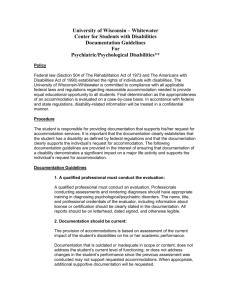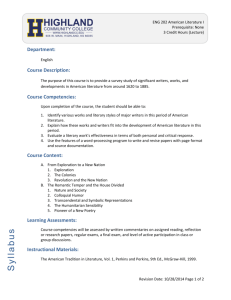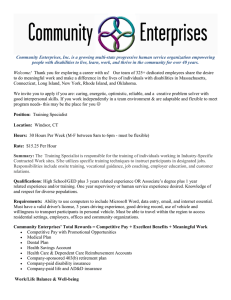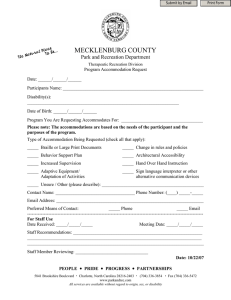Technical Standards Form
advertisement
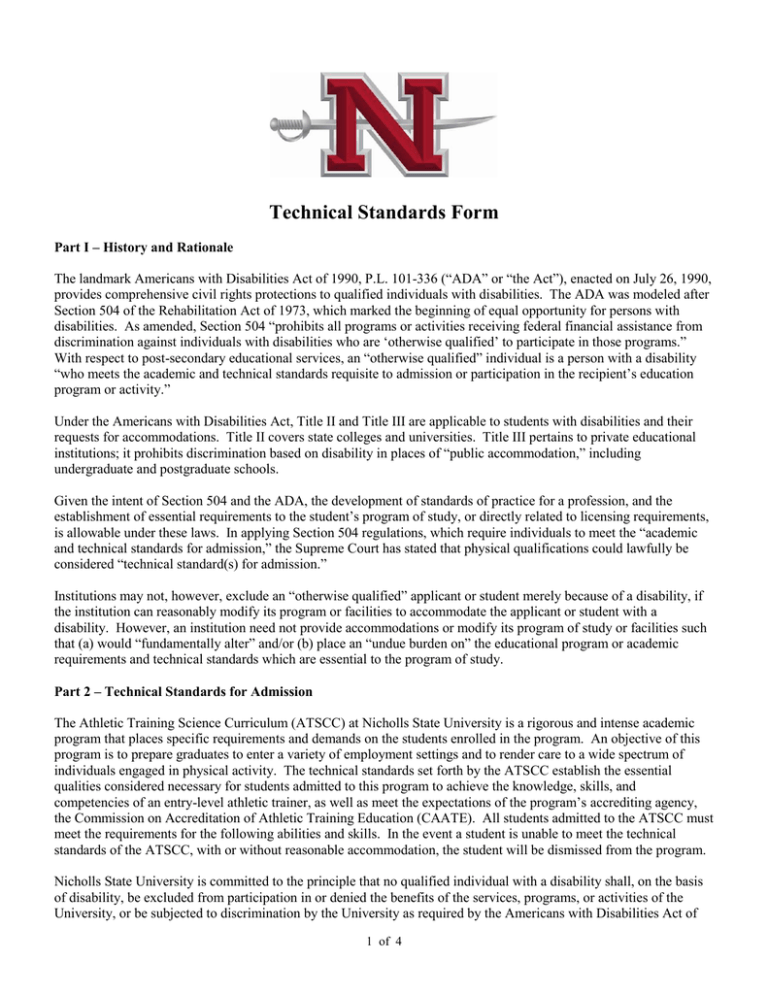
Technical Standards Form Part I – History and Rationale The landmark Americans with Disabilities Act of 1990, P.L. 101-336 (“ADA” or “the Act”), enacted on July 26, 1990, provides comprehensive civil rights protections to qualified individuals with disabilities. The ADA was modeled after Section 504 of the Rehabilitation Act of 1973, which marked the beginning of equal opportunity for persons with disabilities. As amended, Section 504 “prohibits all programs or activities receiving federal financial assistance from discrimination against individuals with disabilities who are ‘otherwise qualified’ to participate in those programs.” With respect to post-secondary educational services, an “otherwise qualified” individual is a person with a disability “who meets the academic and technical standards requisite to admission or participation in the recipient’s education program or activity.” Under the Americans with Disabilities Act, Title II and Title III are applicable to students with disabilities and their requests for accommodations. Title II covers state colleges and universities. Title III pertains to private educational institutions; it prohibits discrimination based on disability in places of “public accommodation,” including undergraduate and postgraduate schools. Given the intent of Section 504 and the ADA, the development of standards of practice for a profession, and the establishment of essential requirements to the student’s program of study, or directly related to licensing requirements, is allowable under these laws. In applying Section 504 regulations, which require individuals to meet the “academic and technical standards for admission,” the Supreme Court has stated that physical qualifications could lawfully be considered “technical standard(s) for admission.” Institutions may not, however, exclude an “otherwise qualified” applicant or student merely because of a disability, if the institution can reasonably modify its program or facilities to accommodate the applicant or student with a disability. However, an institution need not provide accommodations or modify its program of study or facilities such that (a) would “fundamentally alter” and/or (b) place an “undue burden on” the educational program or academic requirements and technical standards which are essential to the program of study. Part 2 – Technical Standards for Admission The Athletic Training Science Curriculum (ATSCC) at Nicholls State University is a rigorous and intense academic program that places specific requirements and demands on the students enrolled in the program. An objective of this program is to prepare graduates to enter a variety of employment settings and to render care to a wide spectrum of individuals engaged in physical activity. The technical standards set forth by the ATSCC establish the essential qualities considered necessary for students admitted to this program to achieve the knowledge, skills, and competencies of an entry-level athletic trainer, as well as meet the expectations of the program’s accrediting agency, the Commission on Accreditation of Athletic Training Education (CAATE). All students admitted to the ATSCC must meet the requirements for the following abilities and skills. In the event a student is unable to meet the technical standards of the ATSCC, with or without reasonable accommodation, the student will be dismissed from the program. Nicholls State University is committed to the principle that no qualified individual with a disability shall, on the basis of disability, be excluded from participation in or denied the benefits of the services, programs, or activities of the University, or be subjected to discrimination by the University as required by the Americans with Disabilities Act of 1 of 4 1990. However, Nicholls State University cannot and does not waive the published degree requirements for ATSC students. To the extent practical, Nicholls State University will make a reasonable accommodation to assist otherwise qualified individuals with disabilities to fulfill their degree requirements, consistent with applicable federal and state law, policies of the Louisiana Board of Regents and Nicholls State University. In the event a student is unable to fulfill these technical standards, with or without reasonable accommodation, the student will not be admitted into the program. Candidates for selection to the Athletic Training Educational Program must demonstrate: 1. The mental capacity to assimilate, analyze, synthesize, integrate concepts and problem solve to formulate assessment and therapeutic judgments and to be able to distinguish deviations from the norm. 2. Sufficient postural and neuromuscular control, sensory function, and coordination to perform appropriate physical examinations using accepted techniques; and accurately, safely and efficiently use equipment and materials during the assessment and treatment of patients. 3. The ability to communicate effectively and sensitively with patients and colleagues, including individuals from different cultural and social backgrounds; this includes, but is not limited to, the ability to establish rapport with patients and communicate judgments and treatment information effectively. Students must be able to understand and speak the English language at a level consistent with competent professional practice. 4. The ability to record the physical examination results and a treatment plan clearly and accurately. 5. The capacity to maintain composure and continue to function well during periods of high stress. 6. The perseverance, diligence and commitment to complete the athletic training education program as outlined and sequenced. 7. Flexibility and the ability to adjust to changing situations and uncertainty in clinical situations. 8. Affective skills and appropriate demeanor and rapport that relate to professional education and quality patient care. Compliance with the program’s technical standards does not guarantee a student’s eligibility for the BOC certification exam. Candidates for selection to the ATSCC will be required to verify they understand and meet these technical standards or that they believe that, with certain accommodations, they can meet the standards. The Office of Disability Services (100-A Peltier Hall) will evaluate any student who states he/she could meet the program's technical standards with accommodation and confirm that the stated condition qualifies as a disability under applicable laws. If a student states he/she can meet the technical standards with accommodation, then the University will determine whether it agrees that the student can meet the technical standards with reasonable accommodation. This would include a review to determine whether the accommodations requested are reasonable, taking into account whether accommodation would jeopardize clinician/patient safety, or the educational process of the student or the institution, including all coursework, clinical experiences and internships/externships deemed essential to graduation. The following is a list of physical, cognitive, psychomotor, and affective variables that may impact essential work related functions of the entry-level athletic trainer. These areas are representative of the curricula presentation and may relate to performance outcomes specific to didactic, laboratory, and clinical education in Athletic Training Science. 2 of 4 A. Visual Acuity Ability to see all colors of the spectrum Ability to distinguish calibrated markers Ability to identify digital displays and controls in differing lighted environments Ability to determine the depth of instrument placement Ability to read small print on medical instrumentation or containers B. Hearing Acuity Ability to hear alarms, beeper, and pages Ability to hear and respond to verbal communication in the work setting Ability to distinguish different alarm sounds/tones on medical devices C. Physical Acuity Ability to perform all ranges of body motions including walking, bending, stretching, reaching, and twisting of the upper and lower back. Ability to lift 35 pounds (weight of small child or small equipment) alone Ability to stand and/or sit for long periods of time Ability to perform CPR; use of hands for manually compressing resuscitation equipment, and the use of hands and body for performing chest compressions Ability to write legible for required documentation Ability to move swiftly when the situation demands D. Communication Ability to communicate with physicians, coaches, co-workers, other health care workers, the athlete and the athlete’s family E. Mental Stress Ability to function appropriately under stress without hesitations using all knowledge and skills require to perform the task at hand Ability to work long hours (8 to 12 hours), adapting to changes in the clinical schedule and/or emergency situations Ability to function as a team member and to follow the appropriate administrative protocol and/or chain of command Ability to review and use student-athlete data in a confidential and professional manner Ability to make quick, life saving decisions F. Clinical Behavior Requirements Must be patient, kind, and tactful in dealing with athletes and their families Must understand that all information obtained in the clinical facilities is strictly confidential and it is not to be discussed outside the training room Must attend clinical experiences as required. 3 of 4 Technical Standards Signature Form Statement of students NOT requesting accommodations: I certify that I have read and understand the technical standards for each selection listed above, and I believe to the best of my knowledge that I meet each of these standards without accommodation. I understand that if I am unable to meet these standards with reasonable accommodation, I will be dismissed from the program. Name of Applicant: Date: ____________ Signature of Applicant: ___________________________________ Statement for students requesting accommodation: I certify that I have read and understand the technical standards for selection listed above and I believe to the best of my knowledge that I can meet each of these standards with accommodation. I will contact the Office of Disability Services to determine what services may be available. I understand that if I am unable to meet these standards with reasonable accommodation, I will be dismissed from the program. Name of Applicant: Date: ____________ Signature of Applicant: 4 of 4
